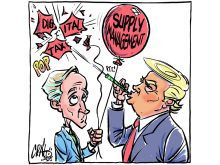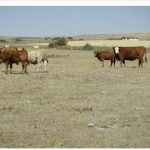Guebert is an agricultural columnist based in Illinois.
The news from Geneva July 29, that the World Trade Organization’s Doha Round of global trade talks had collapsed, hardly came as news to anyone other than WTO leader Pascal Lamy and U.S. trade representative Susan Schwab.
Both had assumed their negotiating strategy, a concession by Europe here, the slow sell-out of U.S. farmers there, would eventually sweet talk the developing world’s big ag upstarts like China, India and Brazil to open their domestic markets to American and European food and goods.
Read Also

Agriculture needs to prepare for government spending cuts
As government makes necessary cuts to spending, what can be reduced or restructured in the budgets for agriculture?
Through seven years and three U.S. trade reps, however, that simple approach failed time and again.
First came the tear gas and broken glass of the battle in Seattle, then the collapse in Cancun and, in December 2005, the yawn competition of Hong Kong.
All the globe trotting and motor-mouthing yielded little more than black eyes for American and European negotiators.
But neither flinched; both stood fast even as the talks drifted toward demise in 2007.
The final breath came in Geneva when Lamy generously offered to cut annual American farm and food subsidies from a now-WTO legal $48 billion to just $14.5 billion.
In return, developing countries, specifically China, India and Brazil, were to promise to keep their domestic markets wide open to U.S. and European farm exports.
To no one’s surprise, the big three balked. Since the Doha Round kicked off in 2001, all three had grown into ag and commercial superpowers both at home and in export markets. None fancied giving America or Europe open access to any market, especially domestic food and fibre markets.
India, the strongest holdout of the three, had three-quarters of a billion reasons not to make the deal, explained Kamal Nath, its commerce minister and WTO negotiator.
“I come from a country where 300 million people live on $1 a day,” he told the Washington Post July 30, “and 700 million people live on $2 a day.
So it is natural for me, and in fact incumbent upon me, to see that our agricultural interests are not compromised.”
Golly, he added, it doesn’t “require rocket science to decide between livelihood security and commercial interests.”
He’s right; you don’t have to be a rocket scientist to choose between livelihood and money. In fact, it takes far less education than that to sell out your fellow countrymen.
Just ask the folks at Bear Stearns, Fannie Mae and IndyMac. They not only traded their livelihoods for cash and fat bonuses, they mortgaged everything they had and were about to sell their mothers when the feds – with your and my collective chequebook – stepped in to hose down the mess.
The failure of Doha doesn’t mean an end to trade talks or a slow walk backward to protectionism. After all, since the WTO talks began in 2001, global trade has more than doubled.
In 2007, the WTO’s 150 members and a couple of dozen non-members bought or bartered $13.6 trillion worth of goods and services.
With that kind of money on the table, does anyone seriously believe world trade will retreat just because a doomed-from-the-start Doha Round finally reached its long foreseen destiny?
If anything, the collapse of Doha is a signal of America’s declining power around the world.
Emerging brutes like India, Brazil and China don’t have to dance to a tune called by a nation that’s borrowing $1 trillion from them and the rest of the world to finance its debt this year and will need that sum plus another $500 billion to cover the record federal deficit next year.
Hey, they simply said, our money, our rules.
If you’re a beggar, that’s a pretty reasonable offer.
















